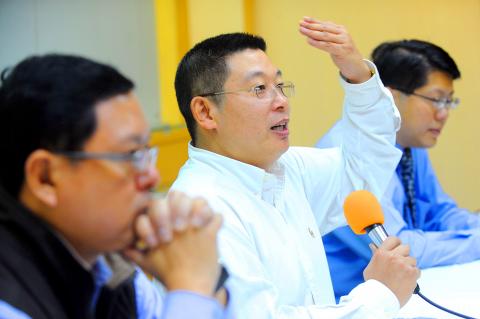
Exiled Chinese dissident Yang Jianli, center, speaks at a forum in Taipei yesterday, flanked by Taiwan Labor Front secretary-general Son Yu-lian, left, and Cross-Strait Agreements Watch Alliance convenor Lai Chung-chiang. Photo: Lo Pei-der, Taipei Times
Taipei Times
Taiwan, Feb 25, 2011
By Loa Iok-sin / Staff Reporter
Despite attempts by Internet users in China to organize anti-government demonstrations similar to the “Jasmine Revolution” in north Africa and the Middle East, exiled Chinese dissident Yang Jianli (楊建利) said in Taipei yesterday that the situation is a little different and it may be more challenging for the Chinese.
Speaking at a forum on development of the pro-democracy movement in China organized by the Taiwan Labor Front and the Cross-Strait Agreements Watch Alliance, Yang said he was excited to see China’s own “Jasmine Movement,” but was not surprised that it had not made much progress.
“Although I think the attempt [on Sunday] was great and very symbolic, I have to say that the [anti-government] action was far from the ‘revolution’ that we saw in Tunisia or in other countries in north Africa or the Middle East,” Yang said.
“The action [on Sunday] was symbolic because it was the first time that dissidents in China have tried to coordinate with each other through the Internet, and the Chinese Communist Party [CCP] regime was very nervous about it,” he said.
Yang was referring to brief pro-democracy rallies with hundreds of participants simultaneously held in 13 cities across China on Sunday, coordinated via the Internet.
During the rallies, demonstrators chanted slogans such as “We want freedom” or “Down with corruption.” Several people — including demonstrators and activist attorneys — were arrested during the rallies.
“It is not easy to copy Tunisia’s ‘Jasmine Revolution’ in China, because the Chinese government has created a very complicated and effective ‘order-maintenance’ system after the Tiananmen Square demonstrations in 1989,” Yang said. “In the past 20 years, China has been continuously learning how to control its population from authoritarian regimes around the world to make sure that the CCP keeps a firm grip on power.”
He said that, for instance, about one-fifth of the people present daily at Tiananmen Square are security officers in uniform or in plain clothes.
However, Yang said that recently he has observed some “cracks” in the order-maintenance system, because the Chinese government now often puts dissidents under house arrest or even “begs them” not to launch anti-government activities in private, instead of jailing them.
“This may be a sign that the system is deteriorating, and there’s a chance that the Chinese people could find cracks in it,” he said. “I don’t know when the opportunity will come, but I’m sure it will come one day.”
